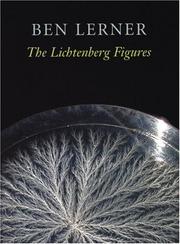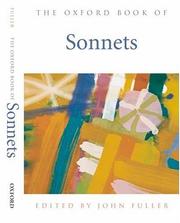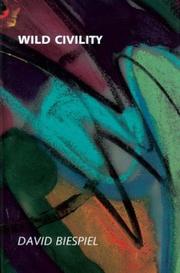| Listing 1 - 9 of 9 |
Sort by
|
Book
Year: 1941 Publisher: New York ; London : Harper & brothers,
Abstract | Keywords | Export | Availability | Bookmark
 Loading...
Loading...Choose an application
- Reference Manager
- EndNote
- RefWorks (Direct export to RefWorks)

ISBN: 1556592116 Year: 2004 Publisher: Port Townsend : Copper Canyon press,
Abstract | Keywords | Export | Availability | Bookmark
 Loading...
Loading...Choose an application
- Reference Manager
- EndNote
- RefWorks (Direct export to RefWorks)

ISBN: 0192142674 9780192142672 Year: 2000 Publisher: Oxford [England]: Oxford university press,
Abstract | Keywords | Export | Availability | Bookmark
 Loading...
Loading...Choose an application
- Reference Manager
- EndNote
- RefWorks (Direct export to RefWorks)
Book
ISBN: 0571107745 9780571107742 Year: 1976 Publisher: London: Faber and Faber,
Abstract | Keywords | Export | Availability | Bookmark
 Loading...
Loading...Choose an application
- Reference Manager
- EndNote
- RefWorks (Direct export to RefWorks)
Book
ISBN: 0571107753 Year: 1976 Publisher: London Faber and Faber
Abstract | Keywords | Export | Availability | Bookmark
 Loading...
Loading...Choose an application
- Reference Manager
- EndNote
- RefWorks (Direct export to RefWorks)
Book
Year: 1930 Publisher: : Philadelphia, Pa.
Abstract | Keywords | Export | Availability | Bookmark
 Loading...
Loading...Choose an application
- Reference Manager
- EndNote
- RefWorks (Direct export to RefWorks)

ISBN: 0295806796 9780295806792 0295983515 9780295983516 0295983523 9780295983523 Year: 2003 Publisher: Seattle : University of Washington Press,
Abstract | Keywords | Export | Availability | Bookmark
 Loading...
Loading...Choose an application
- Reference Manager
- EndNote
- RefWorks (Direct export to RefWorks)
David Biespiel's long poetic lines crackle with rhythmic energy and a jazzy, bittersweet richness of language. Rolling out across the page like darkly luminous highways, his innovative, nine-line "American sonnets" promise adventure, offering a variant on the sonnet form that is both lyric and dramatic and bringing his masterful formal inventiveness to free verse. "I've come to imagine the nine-line sonnet to be like one of those classic Thunderbirds, " says Biespiel, "something distinctly American: wide, roomy, and with a robust engine." The vastly varied voices within the poems are united by a wonderfully limber diction. Using with revelatory precision the vocabularies of history, science, art, sport, philosophy, religion, literature, government, and domestic life, Biespiel has crafted a hip, melodic, elastic language that travels the registers of expression: lush and coarse, gaudy and austere, pliant and rigidly tough. The civility of the poems is the form; the wildness is the bristling energy of the language. Passionate, resilient, rich with wit and word play, these poems affirm David Biespiel's increasing stature as a poet of remarkable accomplishment and promise.
Book
ISBN: 0521514673 052173553X 1139801007 0511973756 Year: 2011 Publisher: Cambridge : Cambridge University Press,
Abstract | Keywords | Export | Availability | Bookmark
 Loading...
Loading...Choose an application
- Reference Manager
- EndNote
- RefWorks (Direct export to RefWorks)
Beginning with the early masters of the sonnet form, Dante and Petrarch, the Companion examines the reinvention of the sonnet across times and cultures, from Europe to America. In doing so, it considers sonnets as diverse as those by William Shakespeare, William Wordsworth, George Herbert and e. e. cummings. The chapters explore how we think of the sonnet as a 'lyric' and what is involved in actually trying to write one. The book includes a lively discussion between three distinguished contemporary poets - Paul Muldoon, Jeff Hilson and Meg Tyler - on the experience of writing a sonnet, and a chapter which traces the sonnet's diffusion across manuscript, print, screen and the internet. A fresh and authoritative overview of this major poetic form, the Companion expertly guides the reader through the sonnet's history and development into the global multimedia phenomenon it is today.
Sonnets, English --- Sonnet --- Sonnets, American --- History and criticism.
Book
ISBN: 9780521735537 9780521514675 0521514673 052173553X 9780511973758 Year: 2011 Volume: *162 Publisher: Cambridge : Cambridge University Press,
Abstract | Keywords | Export | Availability | Bookmark
 Loading...
Loading...Choose an application
- Reference Manager
- EndNote
- RefWorks (Direct export to RefWorks)
Beginning with the early masters of the sonnet form, Dante and Petrarch, the Companion examines the reinvention of the sonnet across times and cultures, from Europe to America. In doing so, it considers sonnets as diverse as those by William Shakespeare, William Wordsworth, George Herbert and e. e. cummings. The chapters explore how we think of the sonnet as a 'lyric' and what is involved in actually trying to write one. The book includes a lively discussion between three distinguished contemporary poets - Paul Muldoon, Jeff Hilson and Meg Tyler - on the experience of writing a sonnet, and a chapter which traces the sonnet's diffusion across manuscript, print, screen and the internet. A fresh and authoritative overview of this major poetic form, the Companion expertly guides the reader through the sonnet's history and development into the global multimedia phenomenon it is today
Sonnets, American --- Sonnet --- LITERARY CRITICISM / European / English, Irish, Scottish, Welsh. --- European --- English, Irish, Scottish, Welsh --- English, Irish, Scottish, Welsh. --- Poetry --- English literature --- Sonnets, English --- History and criticism. --- Literary criticism --- History and criticism --- American sonnets --- American poetry --- 82-14 --- 82-14 Lyriek. Minnezang. Religieuze poëzie. Lied --- Lyriek. Minnezang. Religieuze poëzie. Lied --- Sonnets anglais --- Sonnets américains --- Sonnets --- Histoire et critique --- Sonnets américains
| Listing 1 - 9 of 9 |
Sort by
|

 Search
Search Feedback
Feedback About UniCat
About UniCat  Help
Help News
News